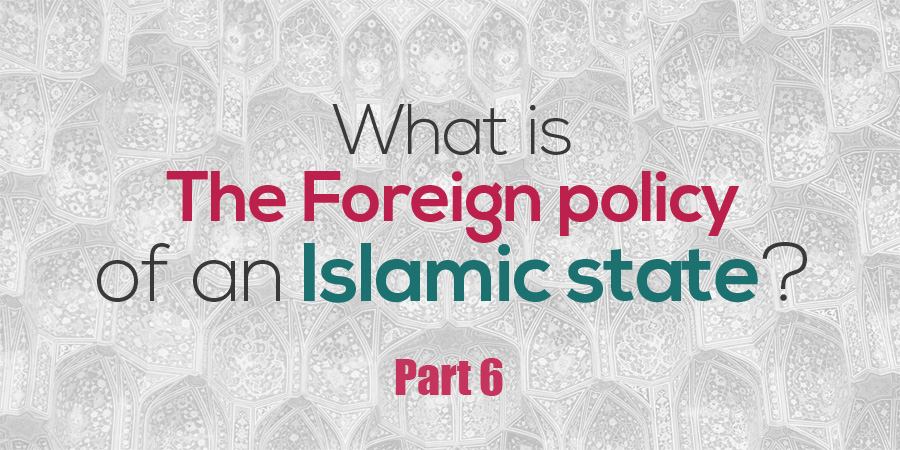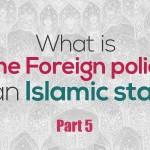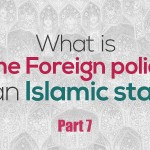What is the Foreign Policy of an Islamic State? (6)
 What is the Foreign Policy of an Islamic State? (6)
What is the Foreign Policy of an Islamic State? (6)
The Islamic State’s Relations with the Muslims of the World
Islam considers all Muslims to be one ummah, a community whose basis is faith and common objectives, and among all its constituent units exists a deeper unity which does not allow the differences of region, race, language, and nation to disrupt and disintegrate it. The Qur’an declares:
إِنَّ هَٰذِهِ أُمَّتُكُمْ أُمَّةً وَاحِدَةً وَأَنَا رَبُّكُمْ فَاعْبُدُونِ
“Surely this community of yours is one community (ummah), and I am your Lord, therefore serve Me.” (21:92)
According to this verse, Muslims are identified as one ummah, as parts of which they move towards a common goal, strive to realize their common objectives, worship one and the only God.
In many traditions Muslims are described as one body, and different units of the Muslim ummah are regarded as the organs of a single body. A few of the traditions are quoted here in order to substantiate the point.
Abu Said narrates from the Prophet (S) that he said, “A believer’s relationship to other believers is like that of the different parts of a building, each of which supports the other.” 1
The Prophet (S) said: “A believer with respect to other believers is related like the head is related to the body. A believer feels the pain of other believers as the head feels the pain of the body.” 2
The Prophet (S) said: “One who gets up in the morning and his mind is not preoccupied with the matters of Muslims, is not one of them. “3
Imam Ja’far al‑Sadiq (A) said: “Muslims are related to one another like the parts of a body; if a part of a body is in pain, other parts of it cannot remain unaffected.” 4
Al‑Imam al‑Sadiq (A) said: “The believers are related to one another like brothers born of the same parents; if any one of them is injured, others are kept awake the whole night for his sake.”5
Al‑Imam al‑Sadiq (A) said further: “A Muslim is the brother of other Muslims; he is never unjust to them, never betrays them, and is never treacherous to them. He always strives to help them and treats them sympathetically and brotherly; and helps those among Muslims who are needy, and obeys the command of God for being merciful to one another. He remembers with compassion and grief his brother who has gone away‑in the same way as the Helpers (al‑’Ansar) of the Prophet (S) helped their brothers.” 6
All these traditions lead us to the conclusion that all Muslims are brothers and are like a single body, and therefore can never be indifferent towards one another. Among them should prevail the spirit of cooperation, brotherhood, fraternity, good will, love, sympathy, and unity of direction and purpose, and they should be always united for the defense of the Ummah. From this we can infer that the responsibility of the Islamic State is not confined to its boundaries only, but it is also responsible for and committed to all individuals of the Muslim Ummah. It should try to realize, as far as possible, the following objectives:
(1) Propagation of the genuine teachings of Islam among all the Muslims of the world by means of distribution of books, journals, and daily papers, sending preachers, arranging cultural exchange programs, deputing teachers, establishing religious institutions like mosques and madrasah’s, chalking out effective programs of religious instructions and making them accessible to all the believers, and making use of all other vehicles of propaganda.
(2) Full support to all Islamic movements and struggles for the freedom of the Muslims of the world.
(3) Economic aid to all the deprived, oppressed, and needy people of the world.
(4) Defense of all the victims of injustice arid tyranny.
(5) Endeavour for promoting the cause of Muslim unity.
(6) Defense of the independence of the Muslims wherever and whenever their freedom is endangered by the aggression of the enemies.
The Islamic government has to fulfill these great responsibilities in accordance with its resources and strength with due consideration of its own interests with respect to other countries and nations and their varying conditions and circumstances. It is the Islamic State’s duty to explore and investigate all the existing possibilities and conditions thoroughly, so that it is able to frame its foreign policy accordingly.
Written by Ibrahim Amini
References:
- Ibn Hajar, Ahmad ibn Muhammad al‑Haythami, Majma` al‑zawa’id, vol. VIII, p. 87.
- 2. Majma ‘al‑zawa’id, vol. VIII, p. 87.
- AI‑Kafi, vol. II, p. 164.
- 4., vol. II, p. 166.
- 5., vol. II, p. 165.
- 6., vol. II, p. 174.


